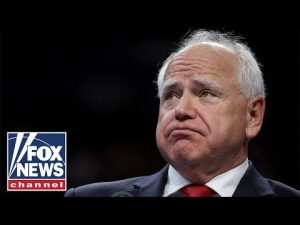On a significant day that many are calling historic, the political stage is set for a new era in international relations, led by none other than Donald Trump. Senior Adviser Corey Lewandowski, who has closely accompanied Trump during his campaigns, joined discussions on the implications of this monumental visit to Paris. The anticipation surrounding Trump’s engagement with global leaders has reached a fever pitch, especially when considering his robust approach to foreign policy that promises a return to “America First.”
As images of the unfolding events in Paris make their way across screens, it’s clear that Trump’s reappearance on the world stage is capturing the attention of major figures like French President Emmanuel Macron and Ukrainian President Volodymyr Zelensky. These meetings are more than just symbolic; they carry significant weight in restoring America’s stature. Macron and Zelensky recognize the shift that has taken place, as Trump brings a vigorous energy that has been noticeably absent under the current administration. It appears world leaders are eager to engage with the man who portrays a revitalized vision for America’s role globally.
This first major overseas visit post-election is not simply about ceremonial handshakes and photo opportunities; it represents a fulcrum on which American diplomacy swings. For years, Biden’s administration has been criticized for its listless engagements that have occasionally left allies feeling overlooked. The memory of Biden dozing off during important discussions in Africa stands in stark contrast to the vibrant leadership style that Trump embodies. Lewandowski and others are drawing parallels to the pivotal shifts in leadership seen in the past, referencing Ronald Reagan’s welcoming approach following Jimmy Carter’s tenure. It is evident that proponents of Trump are rallying for a revival of assertive American diplomacy.
The meetings in Paris are likely to shape economic and military support frameworks as Trump reinforces his stance of fair trade and solid border policies. His dialogues with world leaders suggest a return to prioritizing American interests while engaging with the international community. As the political winds shift, the calls for collaboration and strategizing outline a framework where allies might rally around a reinvigorated sense of purpose. Trump’s assertion that no more “laughing stock” dynamics will prevail under his command resonates loudly, given the stakes involved for the U.S. economy and security.
In the weeks leading up to his formal return to power, there is a growing recognition that Trump’s influence is already being felt. As the new president-elect, his ability to command attention from figures such as Trudeau, who recently sought to negotiate terms during a visit to Mar-A-Lago, indicates the seriousness with which global leaders view Trump’s perspective on trade and sovereignty. The tone of unity and determination emanating from these discussions implies a shift towards cooperation that aligns with Trump’s agenda for a more equitable global economic landscape.
With Trump poised to take the helm once again, the stakes have never been higher. The wait-and-see attitude toward his administration is slowly transforming into active engagement as other countries rush to establish working relationships before he officially steps back into the Oval Office. America may very well be on the verge of a significant turnaround, rekindling its longstanding reputation as a dominant player on the world stage. The energy surrounding Trump’s meetings not only fuels optimism among his supporters but also sends a clear message to both allies and adversaries: the era of bold American leadership is back, and it is ready to collate itself with the world once more.







